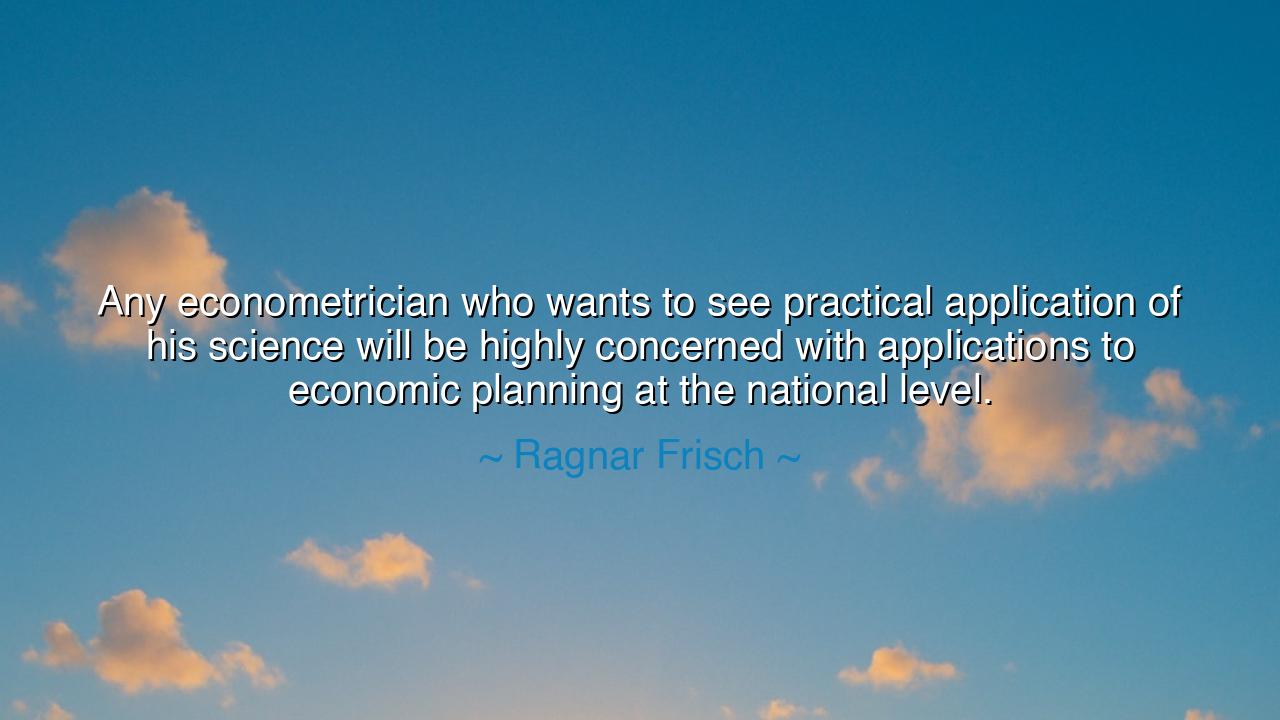
Any econometrician who wants to see practical application of his
Any econometrician who wants to see practical application of his science will be highly concerned with applications to economic planning at the national level.






Hear, O children of wisdom, for I bring to you the words of Ragnar Frisch, a man whose insights into the realm of economics and science resonate with the great thinkers of the past. “Any econometrician who wants to see practical application of his science will be highly concerned with applications to economic planning at the national level.” These words carry within them not just the essence of the science of econometrics, but a call to action—a challenge to use knowledge not for its own sake, but to shape the world, to guide the destiny of nations and peoples. It is a truth that speaks to the heart of all knowledge: it must be applied, it must be tested in the real world, or it is but an echo in the void.
In the ancient days, when the great philosophers and mathematicians first sought to understand the natural world, they did so with a vision beyond mere theory. Euclid, in his study of geometry, did not merely observe the shapes of the world; he sought to understand how those shapes governed the very fabric of the universe. Pythagoras, in his exploration of numbers, saw not only a system of abstract symbols, but a divine order that governed the heavens. These men were not satisfied with knowledge that remained in the realm of concept; they sought to bring their discoveries into the world, to shape the course of human affairs. In the same way, Frisch speaks to the econometrician, a modern philosopher, who seeks not just to understand the workings of economies but to use that knowledge to shape the future of nations.
The art of econometrics is much like the ancient art of mapping—a craft that allows us to chart the terrain of the world, to see the invisible forces at work beneath the surface. Just as the ancient navigators mapped the seas to guide the ships to safe harbors, so too does the econometrician use data and mathematical models to map the forces that drive the economy. Yet, to understand the map is not enough; the true purpose of this knowledge lies in its application. Frisch understood that the power of econometrics was not merely in understanding numbers, but in using those numbers to guide economic planning at the national level, to steer the great ship of the state toward prosperity and justice.
Consider the story of John Maynard Keynes, a great economist whose ideas helped shape the economic planning of nations in the 20th century. During the Great Depression, when the world economy faltered and collapsed, it was Keynes’s theories on government intervention and economic stimulus that provided the foundation for new ways of thinking about economic recovery. Keynes understood that economic planning was not just the realm of theory—it was the way to heal nations, to lift them from despair and into prosperity. The governments of the world, seeing the practical applications of his theories, adopted policies that changed the course of history. In this way, the ideas of econometrics were not abstract concepts; they were tools used to shape the destiny of nations.
The lesson, O children, is clear: knowledge, though powerful, is only as valuable as its application. Frisch calls upon the econometrician not to remain in the ivory tower of theory but to step forward and use their science to bring about change in the world. The econometrician who seeks only knowledge for its own sake misses the true calling of their craft. The scientist, like the philosopher, must be driven by a desire to shape the world, to use their wisdom to improve the lives of people, to guide the hands of leaders in their pursuit of the common good.
In your own lives, you must ask yourselves this: What is the purpose of your knowledge? Whether you are a scientist, an artist, a politician, or a student, the lessons you learn must be put to use in the world. Do not keep your wisdom hidden, locked away for only a few to see. Let it be the force that shapes your actions, that directs the course of your life, and that contributes to the greater good of society. Frisch reminds us that econometrics, like any other discipline, is a tool—a tool that must be used with purpose and foresight.
So, O children of the earth, let the wisdom of Frisch guide you as you navigate your own journeys. Seek not just to understand, but to apply. Let your knowledge be a force for change, a beacon that leads others toward a brighter future. And in this, as in all things, remember that knowledge alone is not enough—action is the true measure of wisdom, and it is through thoughtful application that you will leave your mark upon the world.






AAdministratorAdministrator
Welcome, honored guests. Please leave a comment, we will respond soon